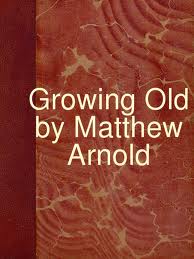This poem basically revolves around getting old, and old age. The fundamental theme of the poem “Growing Old” by Matthew Arnold is the issue of aging. The poem is about the misfortune of old age, which is to forget what it was like to be young. Arnold says that when someone gets old he seems as though he is losing glories and fading away from his life from shines of youth.

Growing Old is a remarkable poem exploring the numerous implications of growing old. Old age is such in which the indications of youth have all disappeared and we find ourselves emotionless, frozen while people value and appreciate an old man’s wisdom.
In the poem, Arnold questions his readers as to what it would be like to grow old. Whether it would be like to lose the glory; great honor, praise, or distinction accorded by common consent; renown: something conferring honor or renown: a highly praiseworthy asset: adoration, praise, and thanksgiving offered in worship: majestic beauty and splendor; resplendence: the splendor and bliss of heaven; perfect happiness: a height of achievement, enjoyment, or prosperity: of the form; the shape and structure of an object: the body or outward appearance of a person or an animal considered separately from the face or head; figure: the essence of something: the mode in which a thing exists, acts, or manifests itself; kind.
majestic beauty and splendor; resplendence: the splendor and bliss of heaven; perfect happiness: a height of achievement, enjoyment, or prosperity: of the form; the shape and structure of an object: the body or outward appearance of a person or an animal considered separately from the face or head; figure: the essence of something: the mode in which a thing exists, acts, or manifests itself; kind.
Is it for beauty to forego; to precede, as in time or place: her wreath?; a ring or circlet of flowers, boughs, or leaves worn on the head, placed on a memorial, or hung as a decoration: a representation of this ring or circlet, as in woodwork: a curling or circular form; Yes, but not for this alone.
Generally, young people frequently imagine the joys of being older, however, when the time actually arrives and we have aged, we can no longer enjoy life, in the same manner, we used to.
It’s because as we age, our bodies have slowed down and as a result, we have become frail and extremely feeble. The poet is trying to say that we should enjoy the present time we’re given in life rather than looking forward to a particular age that we think we will enjoy.
Arnold’s cynicism on the subject of aging leaves no room for brightness or optimism. The reader come across such negativity right away, for in the first stanza Arnold ascertains, in answer to his question “What is it to grow old?” that aging entails “[losing] the glory of the form.” The words “lose the glory” brings to understanding, a disastrous and rather catastrophic experience. Arnold experiences an absence of feeling in accordance with his age.
Inevitably, old age has its downsides, yet, if met with joyful expectancy can ascertain a fulfilling experience. The final choice is whether to give in to old age and its blows, both on mind and body, or whether to seek fulfillment from the understanding and knowledge gained from old age, depends entirely on the reader. The choice which Arnold makes, to cringe with old age’s blows, brings him nothing but deep, pulsating depression.